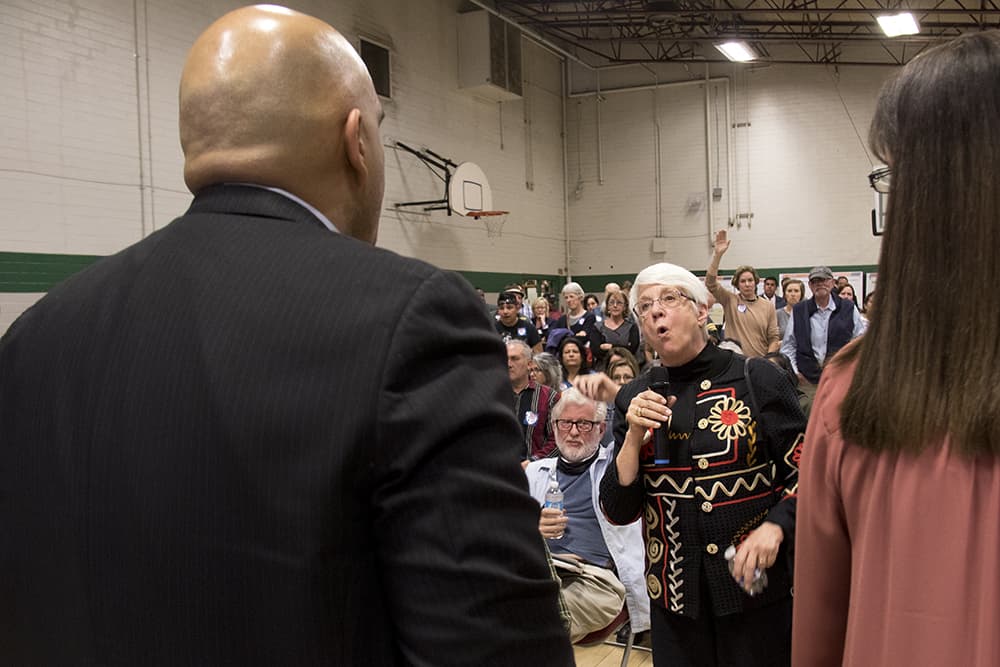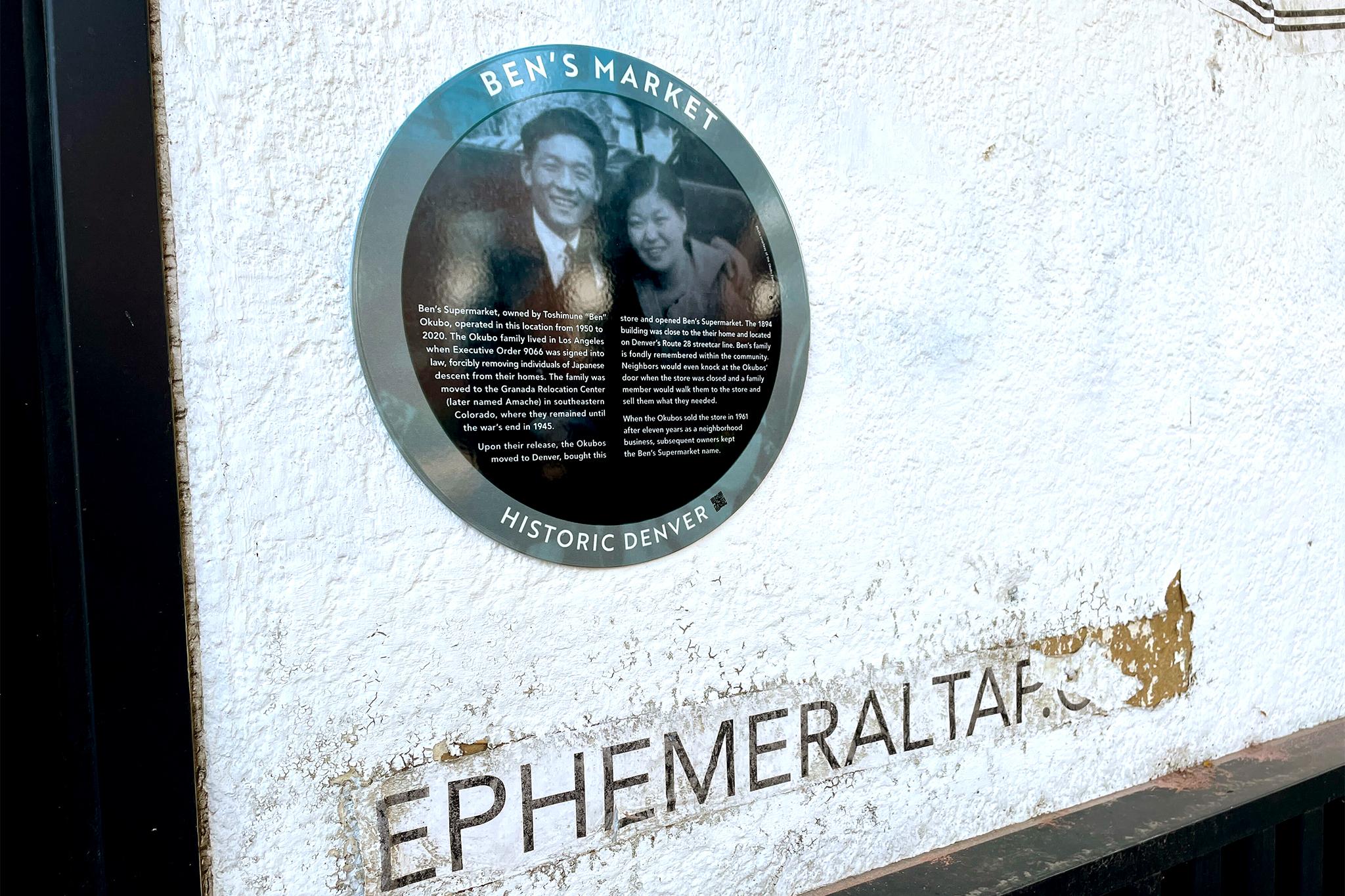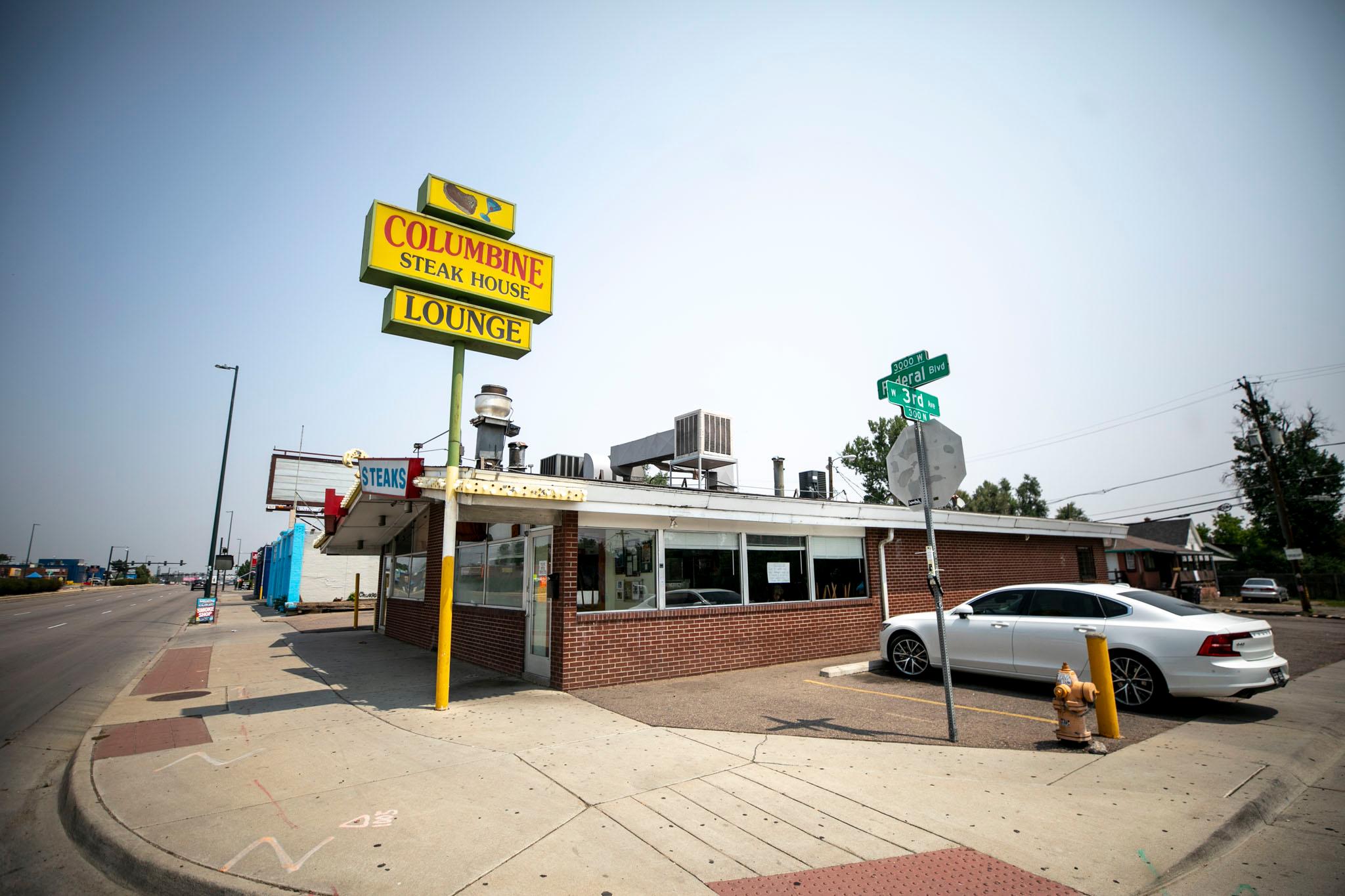
Colorado Department of Transportation convened a meeting Thursday at the Swansea Recreation Center to talk about the path forward in expanding I-70. The dozens of community members who attended wanted to talk about the path not taken, a reroute north of Denver along the I-270 corridor.
CDOT has followed the law and intends to move forward, Executive Director Shailen Bhatt repeatedly told the raucous crowd that often shouted over him, and if activists disagree with CDOT's conclusion, they should keep pursuing legal action against the agency.
"We are not here to move the project," Bhatt said. "That is not what we are here to discuss. ... People have talked about lawsuits. That is the American process."
The meeting opened with activists giving a community presentation.
They wore black bandanas with "Ditch the Ditch" over their faces, not to hide their identities, they said, but to represent the air pollution from which they have to protect themselves.
They said they plan to move forward with legal action and hope to prevail, but they also asked elected officials to stop the project and threatened to make it an electoral issue in 2018 and 2019, from the state legislature to the governorship to mayor and City Council.
Candi CdeBaca, founder of the Cross Community Coalition, said that activists would focus their attention on state legislators, at the advice of City Council members. Speaker of the House Crisanta Duran, whose district includes Elyria-Swansea, was in the audience, as was Rep. Dan Pabon and Rep. Joe Salazar.
"This is a state project, and they are the only ones who can help us now," CdeBaca said. "If they will not represent us, we will elect others who will."
CdeBaca said whichever contractor agrees to head up the project should be "prepared to lose time, money and credibility because we're here to resist by any means necessary," and she linked the effort to stop the highway to other activist movements, from the Women's March to the Dakota Access Pipeline. And she recalled Jane Jacobs, who stopped a highway from being run through Greenwich Village in Lower Manhattan even when construction had already started.
Duran said that it was a shame that I-70 was built where it was in the 1960s, and if she could roll back time, she would prevent it. But the highway is here now.
"I know you are angry. I know you are angry. I am sorry you are angry, but we are here to listen to the community," she said at one point.
"We are the community!" several people shouted back.

And Duran made a curious comment, that perhaps it was "time for a new conversation with Adams County." But after the meeting, she wouldn't really clarify what that conversation should be about, and she reiterated that the reroute just creates a different problem.
"This is a predominantly Latino, low-income neighborhood," she said. "If we did the reroute, the areas it would go through are equally Latino and low-income. It's a very tough issue. There is no easy answer."
When Bhatt took the microphone, lots of people didn't like what he had to say.
A facilitator spent much of the meeting saying, "Let him speak," as audience members demanded to know how he expected children to play over a freeway, why Adams County could "veto" a reroute while residents of Elyria-Swansea have no choice and whether he would like to live next to I-70.
Susan Aldretti, an aide to Councilwoman At-large Debbie Ortega, demanded to know why CDOT wasn't offering better HVAC systems to people who live near the highway. In response to the agency's own studies, it's installing sophisticated filtration systems for Swansea Elementary School.
"You're going to put it in the school, but you're not going to put it in the house across the street from the school where the children sleep at night," she said. "We know you'll do what's legal. We want you to do what's right."
The only other city representative there was Councilman Paul Lopez, who doesn't represent Elyria-Swansea. Council President Albus Brooks, who does, appears to have been at another community event, and Ortega was dealing with a death in her family.
Many in the audience objected to the way that CDOT characterized the opposition in an open letter posted on the agency's Facebook page:
"In the last two years, a small group of about 60 to 70 people has been angry with CDOT because we decided not to move I-70 out of the Denver area and onto 270. We have looked closely at that idea in various forms over the years and it just doesn’t work," Bhatt wrote.
Against these 60 to 70 people, Bhatt pit the interests of the entire state of Colorado.
It's in the interests of everyone, he said, to expand I-70 in its current location and not reroute it.

"If we were to reroute I-70 to 270, it would require building a new 12-lane highway (and eliminating the existing one in the process) with several new interchanges at a cost of up to $3 billion. That means taking money from other projects in the state to fund something in Denver that most folks don’t want. We can’t do it," he wrote.
"If they slow down or stop the project, we still have to spend $800 million to simply rebuild a crumbling 2 mile bridge that has no other mobility improvements -- meaning you, your family, your goods will continue to sit in more and more traffic over time. We will have failed to make travel easier in Colorado and for the country."
Activists are entitled to press their case as far and as hard as they legally can, he said, but that's the potential consequence CDOT sees of not doing the expansion on the table now. The viaduct is crumbling and has been CDOT's worst rated bridge for years. If activists stop the expansion and the bridge becomes too dangerous, CDOT will rebuild it just as it is today through a fast-tracked emergency process. And that will be that.
"Highways, rail yards, sewage treatment plants, these are all functions of society," he said. "They have to go somewhere."
If the opposition is just 60 to 70 people, they were nearly all in attendance at the meeting.
"I don't have many neighbors who support this project," said Drew Dutcher, president of the Elyria-Swansea Neighborhood Association. "Many are opposed, but most have given up."
They contended that CDOT has never looked closely at the reroute alternative.
"Constraining the study area is the legal technicality you are hiding behind," Katherine Cornwell said. "We are asking for your leadership so we don't have to get justice in court."
But Mark Wander, who became one of the first people to sell his home to CDOT to make room for a wider I-70 back in 2014, recalled that he attended meetings about I-70 in 2003, in 2007, in 2013 and now here it was, in 2017, and construction hadn't even started.
"They kept coming back to us to make this better for the community," he said. "Embrace the possibilities. The more you fight, the more you're cutting off your own heads."












